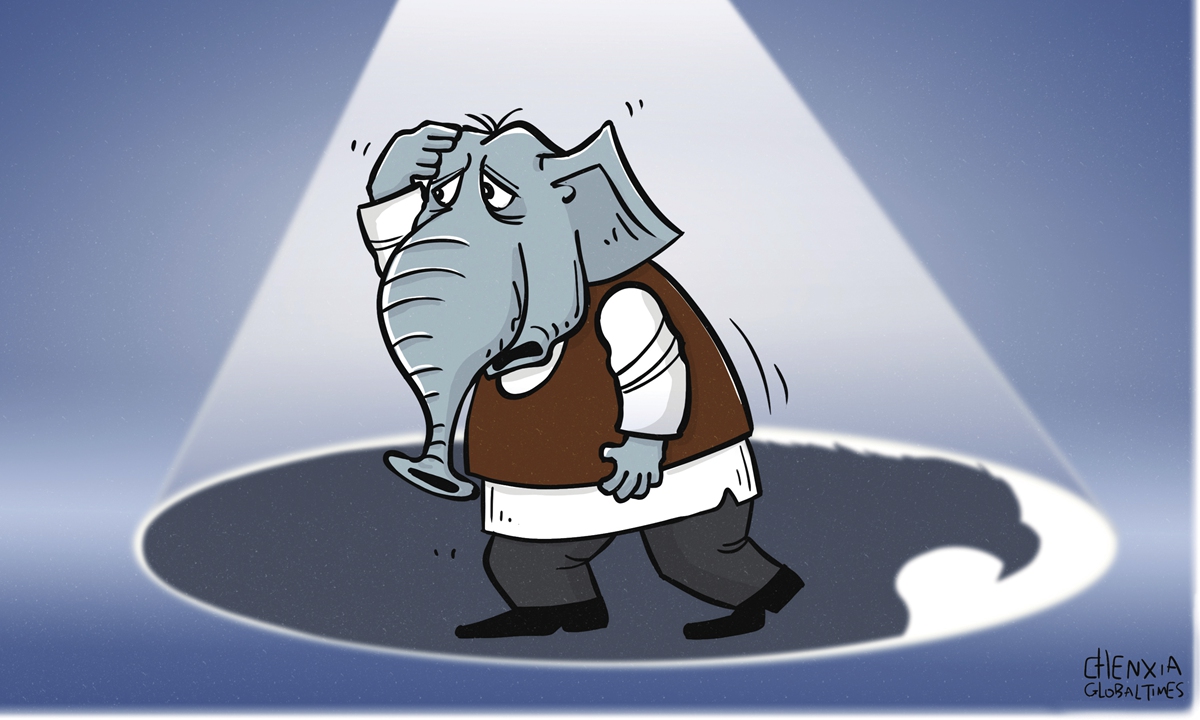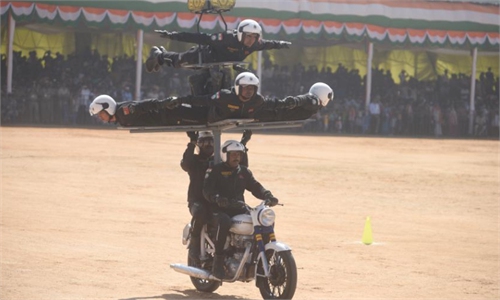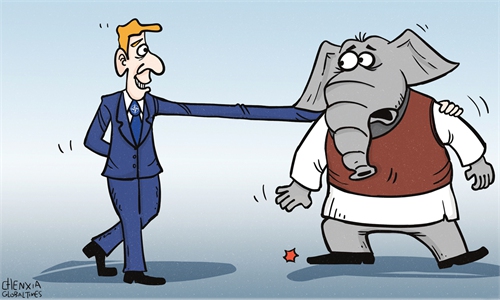Will New Delhi make the right choice as Washington pushes it as a proxy for war?

Illustration: Chen Xia/Global Times
During a visit to India in January, US Assistant Secretary of State for South and Central Asian Affairs Donald Lu said that the US will continue to stand with its Indian partners on the China-India border conflict. About two months ago, the US and India held the "Yudh Abhyas 2022" joint military exercise in Uttarakhand, about 100 kilometers away from the China-India border, and its purpose is self-evident.
Since the intensification of China-US strategic competition, US-India relations have developed rapidly, and China is undoubtedly one of the most important and most enduring factors. Before Joe Biden took office as US president, the US and India had already signed the Logistics Exchange Memorandum of Agreement, the Communications Compatibility and Security Agreement, the Basic Exchange and Cooperation Agreement, etc, providing advanced weapons, and other important information like geo-spatial data for New Delhi.
The Biden administration regards India as the US' most important strategic partner in the Indo-Pacific region, and has further consolidated US-India relations through multilateral platforms including the Quad. By "standing with" India on the China-India border conflict, the Biden administration is not to be directly involved in a possible China-India military conflict, but to encourage New Delhi to take tough measures in the border area. It wants to lead China and India toward an accidental discharge of fire, and then finally go to war under the pressure of the two countries' public opinion.
Inducing some countries to become US' proxies has been Washington's tactic to maintain its world hegemony since the end of WWII. It does not care about the gains and losses of these proxies. The Russia-Ukraine conflict is a proxy war instigated by the US. The US ignores Ukraine's ultimate fate, but by doing so, the US can realize the expansion of NATO, further control the EU, erode the strategic advantages of Western European countries in climate politics and safeguard the interests of US energy groups. It is killing four birds with one stone.
The US has upgraded the "rebalance to Asia-Pacific" into its Indo-Pacific Strategy, and the most notable change is that India is included in the US' network of containing China. It is generally believed that the Indo-Pacific Strategy shows the US is paying more attention to India, and is an important sign of India's growing strength and rising international status. India is very proud of this. But the truth is, Washington found that the strength of the Asia-Pacific region cannot lead to the strategic goal of effectively containing China's rise, and it has to expand its network. India's strength, the intensifying China-India border conflict and the deepening of structural conflicts between the two countries have made India a suitable country as a US' proxy.
A stronger India can better contain China. India's population is close to that of China, and theoretically, it is possible for India to replace China's role as world factory and promote the diversification of supply chains. Provoking China-India border conflicts can distract China's strategic focus and consume China's strength. If a second border war is eventually triggered between the two sides, it would be in the best interests of the US.
But is India willing to be a US' proxy? Since its independence in 1947, India has pursued to be a powerful country and has regarded itself as one of the important major powers. Its ultimate goal is to become a great power on par with the US or other major powers. It's almost impossible for India to agree to act as a minion or a proxy of another country.
But it is also possible that India may make strategic mistakes and objectively become a war agent of the US. On the one hand, India's religious and historical genes have made the country over-confident in its strength and development prospects. On the other hand, nationalism has gradually become increasingly extreme after India has made achievements in economy and diplomacy over recent years.
For example, Modi said shortly after the 2020 Galwan Valley border clash that China did not cross the Line of Actual Control (LAC), but he had to change his words under the pressure of domestic politics and public opinion. This shows that facts may sometimes yield to emotions. This adds to the possibility of India becoming a US' proxy. Besides, the US and its allies are inducing India to make mistakes again on the border issue.
If another armed conflict between China and India over the border issue breaks out, the US and its allies will be the biggest beneficiaries, while India will be the biggest victim. Since the Cold War, proxies have always been the biggest victims in the end.
The author is an associate professor at Sichuan International Studies University. opinion@globaltimes.com.cn



